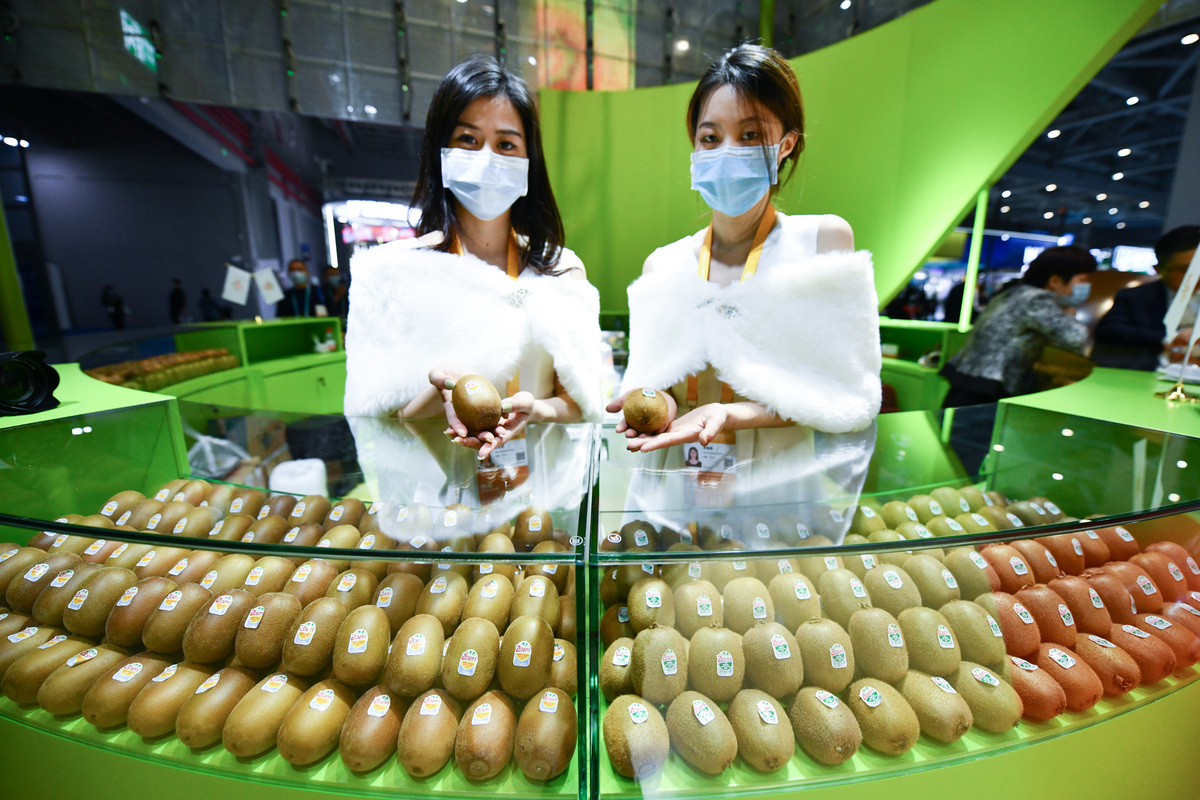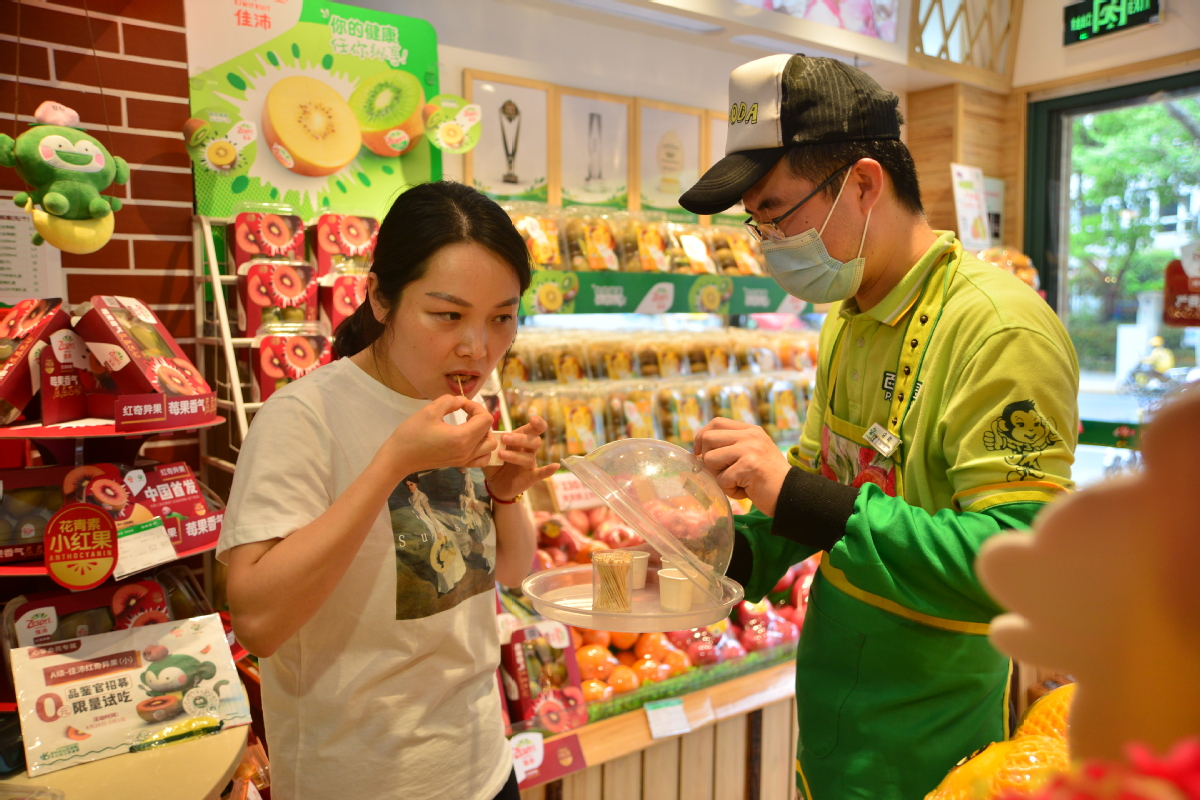By ZHU WENQIAN and ZHONG NAN | China Daily

Commerce with New Zealand grows as trade pact upgraded
An international freighter loaded with a portion of New Zealand’s latest season of kiwifruit arrived in early April at Taizhou Port in Zhejiang province.
At the Port of Tauranga, Bruce Cameron-a longtime kiwi grower, chairman of Zespri, and a cooperative of the nation’s growers-said he couldn’t hide his excitement as he watched the cargo being loaded for Taizhou. He said he looked forward to every Chinese consumer being able to try the cooperative’s fruit.
“Our 2,000 containers loaded on 20 vessels will be shipped to China one after another. In the next five years, we plan to double our sales in China to satisfy the appetite of more Chinese consumers,” Cameron said.
Over the past 20 years, Cameron has fostered good relations with his Chinese business partners. In November, Zespri was named an Authorized Economic Operator, a certification issued by China’s General Administration of Customs that allows the recipient’s products faster clearance into the country.
China accounts for a 25 percent share of Zespri’s kiwi exports. Cameron has promised to pay close attention to health regulations and strictly abide by the requirements of quarantine inspection and risk controls, especially during the COVID-19 pandemic.
During the 1990s, Zespri began cultivating a new variety of kiwis, developed through a natural breeding program, the company said on its website. The new yellow-fleshed gold variety had a less furry outside and a sweeter taste, it said.
With an increasing number of middle-income Chinese consumers, the appetite for top-end foods is growing, and more people are buying imported and domestic tropical fruits to explore a wider variety of foods.
Last year, trade between China and New Zealand reached nearly 160 billion yuan ($25.16 billion), up 27.2 percent year-on-year. The value of fruit imported from New Zealand reached 4.15 billion yuan. Zespri’s sales in China hit 350 million yuan, according to China’s General Administration of Customs.
By 2025, China is predicted to become the world’s largest consumer market. The expansion and upgrading of that market will lead to a greater demand for agricultural products, said Chi Fulin, president of the China (Hainan) Institute for Reform and Development.
Last year, China imported more than 100,000 metric tons of kiwis through Shanghai South Port. The port receives about 80 percent of all of Zespri’s kiwi exports to China, Customs officials said.
This year marks the 50th anniversary of diplomatic relations between China and New Zealand. In that time, their economic ties have grown rapidly.
“In the past 50 years, bilateral relations between New Zealand and China have become increasingly close, and bilateral cooperation in many fields such as economics, trade and culture has continued to expand,” said Clare Fearnley, New Zealand’s ambassador to China.
Fearnley said the improvement of relations between New Zealand and China would bring significant benefits to fruit and horticultural businesses in New Zealand. “The trade exchanges between the two countries are quite resilient. I believe they will definitely recover from the impact of the COVID-19 pandemic.”
She said she hopes for “complete success” for exports of New Zealand kiwis to China this year.

Ashley Taggart, a partner at Lane Neave law firm in New Zealand and a longtime observer of China-New Zealand diplomatic relations, said the firm believes that the two nations will overcome the pandemic’s negative impacts, continue to facilitate investments and further deepen bilateral cooperation.
An upgrade to China’s free trade agreement with New Zealand took effect this month. It further opens markets for goods, services and investment while optimizing rules to promote trade facilitation, Xinhua News Agency reported. Bilateral cooperation will also be strengthened in e-commerce, competition policy, government procurement, the environment and trade, according to the protocol.
It is also the first free trade upgrade agreement between China and a developed country. China signed the FTA with New Zealand in 2008, its first with a developed country.
The upgraded FTA will complement the Regional Comprehensive Economic Partnership agreement signed in 2020 by 15 countries in the Asia-Pacific region, including China and New Zealand. The RCEP agreement, which took effect on Jan 1, covers some 30 percent of the world’s population. It is expected to help facilitate trade liberalization and economic integration in the region, and provide a strong boost to international trade and investment, contributing to global economic recovery.
“China’s growing volume of consumption and imports will create better conditions for other RCEP member economies to increase their exports, and help facilitate regional economic and trade cooperation,” said Wang Yiming, vice-chairman of the China Center for International Economic Exchanges.
Tang Junkai, supply chain manager of Delicay (Shanghai) Fruit Trading Co Ltd, said rapid changes in world affairs imposed a profound impact on the supply chain of fresh fruit globally, and the resilience of the sector’s supply chain has become more important.
China, the world’s second-largest economy, has become New Zealand’s largest trading partner. Despite the pandemic, China-New Zealand trade has grown, according to the Ministry of Commerce.
Tim Knox, deputy director-general of China relations at the Ministry of Primary Industries of New Zealand, said the nation’s advantages in growing high-quality and safe agricultural products have given him full confidence in promoting close cooperation with China.
“We are working closely with Chinese Customs and make corresponding adjustments to the requirements for pandemic prevention and control, and we look forward to bringing more nutritious and sustainable agricultural products from New Zealand to China,” Knox said.
Meanwhile, Ben McLeod, global marketing director of Mr Apple-New Zealand’s leading global apple exporter-said the company has been continuously innovating in its planting technologies for decades.
The apple grower said it is committed to producing high-quality fruit and is looking forward to contributing to the long-term sustainable development of trade between New Zealand and China.
